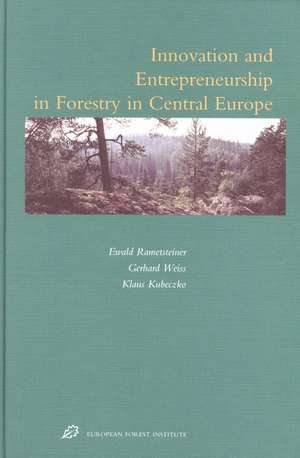Innovation and Entrepreneurship in Forestry in Central Europe: European Forest Institute Research Reports, cartea 19
Autor Ewald Rametsteiner, Gerhard Weiss, Klaus Kubeczkoen Limba Engleză Hardback – 27 oct 2005
Preț: 729.48 lei
Preț vechi: 889.60 lei
-18% Nou
Puncte Express: 1094
Preț estimativ în valută:
139.59€ • 152.10$ • 117.62£
139.59€ • 152.10$ • 117.62£
Carte indisponibilă temporar
Doresc să fiu notificat când acest titlu va fi disponibil:
Se trimite...
Preluare comenzi: 021 569.72.76
Specificații
ISBN-13: 9789004145894
ISBN-10: 9004145893
Pagini: 179
Dimensiuni: 164 x 239 x 19 mm
Greutate: 0.49 kg
Editura: Brill
Colecția Brill
Seria European Forest Institute Research Reports
ISBN-10: 9004145893
Pagini: 179
Dimensiuni: 164 x 239 x 19 mm
Greutate: 0.49 kg
Editura: Brill
Colecția Brill
Seria European Forest Institute Research Reports
Public țintă
Researchers working in the field of innovation and forestry, students, policy and decision-makers, forest owners and managers working in academia, research, forestry, forest-based industries, forest administration, and extension services.Cuprins
Table of Contents
Foreword
Acknowledgements
1. Background and Objectives
2. Theory
2.1 Innovation systems
2.2 Entrepreneurs / entrepreneurship
3. Innovation and Entrepreneurship Monitors
3.1 European Innovation Scoreboard
3.2 Global Entrepreneurship Monitor
4. Method
4.1 Overall approach
4.2 Forest holdings survey
4.3 Institutional system survey
4.4 Case study analysis
5. Frame Conditions for Innovations in Forestry in Central Europe
5.1 Forest resources and their utilization in Central Europe
5.2 Ownership structures
5.3 Educational background of forest managers/owners
5.4 Goals and strategies of forest management
5.5 Decision making structures and distribution of work
5.6 Product mix and contribution to income
6. Forest-owners and Forest Managers as Innovators
6.1 Innovation behaviour
6.2 Sources of impulse and information for innovation
6.3 Fostering factors for innovation
6.4 Impeding factors to innovation
6.5 Suggestions for improvements in innovation support
7. Forest owners and forest managers as entrepreneurs: start-ups in forestry
7.1 Entrepreneurship activities and behaviour
7.2 Support, fostering and impeding factors for start-ups
8. Entrepreneurial Orientation and Future Expectations
8.1 Entrepreneurial orientation of forest owners and forest managers
9. Institutional System of Innovation
9.1 Key actors in sectoral innovation systems and their views
9.2 Market expectations of institutional system actors
10. Innovation Systems and Processes: Lessons from Selected Cases
10.1 Wood products: Looking beyond the forest
10.2 Non-wood products: Marketing traditional products
10.3 Nature conservation services: From regulation to contracts
10.4 Recreational services: Accommodation and forest education
10.5 New technologies: Further mechanisation of forest work
10.6 The organisational challenge: Horizontal and vertical co-operation
10.7 Comparative analysis
10.8 Entrepreneurship in forestry
10.9 The role of sectoral and regional innovation systems in forestry
innovations
11. Conclusions and Recommendations
11.1 Note the frame conditions for innovation
11.2 The current situation: Shortcomings and surprising strengths
11.3 Do institutional actors understand the needs of forest owners and
managers?
11.4 How well are the three innovation system functions fulfilled?
11.5 Summary of recommendations
Abbreviations
References
Foreword
Acknowledgements
1. Background and Objectives
2. Theory
2.1 Innovation systems
2.2 Entrepreneurs / entrepreneurship
3. Innovation and Entrepreneurship Monitors
3.1 European Innovation Scoreboard
3.2 Global Entrepreneurship Monitor
4. Method
4.1 Overall approach
4.2 Forest holdings survey
4.3 Institutional system survey
4.4 Case study analysis
5. Frame Conditions for Innovations in Forestry in Central Europe
5.1 Forest resources and their utilization in Central Europe
5.2 Ownership structures
5.3 Educational background of forest managers/owners
5.4 Goals and strategies of forest management
5.5 Decision making structures and distribution of work
5.6 Product mix and contribution to income
6. Forest-owners and Forest Managers as Innovators
6.1 Innovation behaviour
6.2 Sources of impulse and information for innovation
6.3 Fostering factors for innovation
6.4 Impeding factors to innovation
6.5 Suggestions for improvements in innovation support
7. Forest owners and forest managers as entrepreneurs: start-ups in forestry
7.1 Entrepreneurship activities and behaviour
7.2 Support, fostering and impeding factors for start-ups
8. Entrepreneurial Orientation and Future Expectations
8.1 Entrepreneurial orientation of forest owners and forest managers
9. Institutional System of Innovation
9.1 Key actors in sectoral innovation systems and their views
9.2 Market expectations of institutional system actors
10. Innovation Systems and Processes: Lessons from Selected Cases
10.1 Wood products: Looking beyond the forest
10.2 Non-wood products: Marketing traditional products
10.3 Nature conservation services: From regulation to contracts
10.4 Recreational services: Accommodation and forest education
10.5 New technologies: Further mechanisation of forest work
10.6 The organisational challenge: Horizontal and vertical co-operation
10.7 Comparative analysis
10.8 Entrepreneurship in forestry
10.9 The role of sectoral and regional innovation systems in forestry
innovations
11. Conclusions and Recommendations
11.1 Note the frame conditions for innovation
11.2 The current situation: Shortcomings and surprising strengths
11.3 Do institutional actors understand the needs of forest owners and
managers?
11.4 How well are the three innovation system functions fulfilled?
11.5 Summary of recommendations
Abbreviations
References
Notă biografică
Ewald Rametsteiner. Director of EFI Project Centre INNOFORCE, Department of Economics and Social Sciences, University of Natural Resources and Applied Life Sciences, Vienna, Austria
Gerhard Weiss, Researcher at EFI Project Centre INNOFORCE, Department of Economics and Social Sciences, University of Natural Resources and Applied Life Sciences, Vienna, Austria
Klaus Kubeczko, Researcher, ARC Systems Research GmbH, Seibersdorf, Austria
An independent and non-governmental research body, the EUROPEAN FOREST INSTITUTE - EFI - conducts problem-oriented and multi-disciplinary forest research at the European level in order to serve the needs of policy-making and decision-taking bodies in Europe.
Gerhard Weiss, Researcher at EFI Project Centre INNOFORCE, Department of Economics and Social Sciences, University of Natural Resources and Applied Life Sciences, Vienna, Austria
Klaus Kubeczko, Researcher, ARC Systems Research GmbH, Seibersdorf, Austria
An independent and non-governmental research body, the EUROPEAN FOREST INSTITUTE - EFI - conducts problem-oriented and multi-disciplinary forest research at the European level in order to serve the needs of policy-making and decision-taking bodies in Europe.













